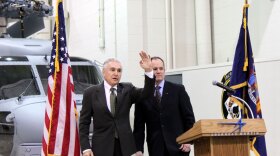The Greater Binghamton Business Journal had an update last week (that's just as quickly gone behind a paywall) on a $1.5 million contract awarded to ENSCO, a military contractor in Endicott.
The contract itself is small potatoes, according to the Business Journal's report, estimated to create about two jobs and retain four, for a company with 225 employees. But the grant will help fund the company's in-depth exploration of high-tech visualization tools for military use.
ENSCO told the Business Journal:
"The real long-term payoff, [director of business development, Thomas] Matarese says, is the eventual "productizing" of the solution to be used for other customized military applications.
The contract in question uses 3-D imaging to help track submarines.
And it's one more testament to the obvious: that government money is the bread and butter of the defense industry that's active throughout the Southern Tier. ENSCO often works as a subcontractor to the bigger names in defense contracting, like Lockheed Martin and BAE, which employ a lot of folks in the region.
The very first announcement of this contract came from Congressman Maurice Hinchey, and was just latest installment in a litany of press releases announcing lobbying efforts for defense contracts and contract success stories. In the release, the congressman said he was happy to announce that a letter he'd sent to the Secretary of the Navy had helped bring the money home.
But when the Innovation Trail followed up, we found out the money doesn't flow quite so simply.
Bob Smith, speaking for the Navy's Rapid Technology Transition program (which awarded the contract), said the congressman's letter "was not a factor" in the award, and that the contract was granted based on the potential of the technology.
Congressman Hinchey's office responded to the Navy's statement with a written statement:
Congressman Hinchey has been supportive of this technology from the beginning and was pleased to write to the Navy on behalf of ENSCO. Regardless of what led to the Navy's final decision, Maurice is happy that engineers, scientists and other workers in Endicott will soon get to work on this essential project.
"Congressmen like to credit for just about anything," says Chris Cavas, who writes for Defense News, a trade publication. He says announcements like this one need to be considered case by case, and that a lot of the time, there's a larger saga going on behind the scenes.
"Everything in Washington ends up being political one way or another," Cavas says. "And that's not unique to the U.S. or to Washington ... It's been thus since the days of ancient Rome and China, and everywhere else in the world. Politics is politics."
And there could be a silver lining to letting the congressman take credit. From the Navy's perspective, having Hinchey on their side couldn't hurt come budget time. Same thing for ENSCO: having your Congressman make the announcement about your contract is better than no congressman on your side, or no contract at all.




